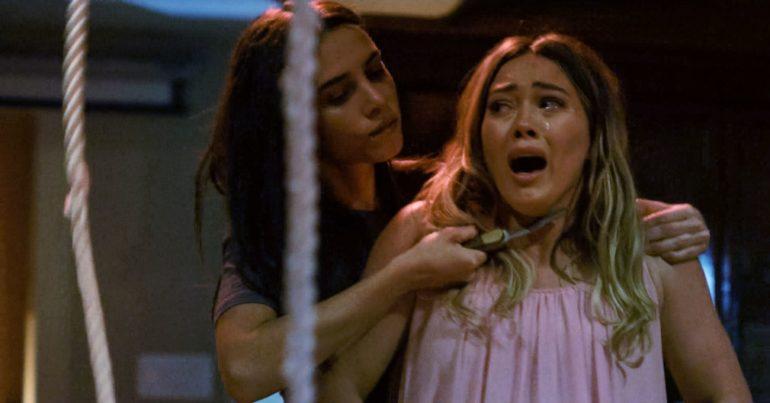Film Review: ‘The Haunting of Sharon Tate’
By Owen Gleiberman
LOS ANGELES (Variety.com) – Over the years, I’ve consumed my share of movies — documentaries, dramatizations, deconstructive punk curios — that play off the Manson murders. The quality of this genre (and by now it is a genre) is hit-or-miss, yet I don’t think I’ve ever seen a Manson film that wasn’t on some level trying for something, for a new shade of insight into that uniquely horrific and resonant chapter of the American dream-turned-nightmare.
But now, I’m afraid, the track record is broken. “The Haunting of Sharon Tate” may be the first “serious” Manson drama that represents a case of pure, unadulterated cheeseball exploitation. The film has nothing of remote fascination to add to the Manson dialogue that some of us have been carrying on for decades. It doesn’t bring you closer to the events; if anything, it seals you outside of them. But the movie’s petty folly — its failure of imagination and morality — is that it actually goes out of its way to turn the Manson murders into schlock horror.
The writer-director, Daniel Farrands, has made documentaries about the “Friday the 13th,” “Nightmare on Elm Street,” and “Scream” franchises, as well as the incidents at Amityville (I write that as if something actually occurred there, which he probably thinks it did), and “The Haunting of ” is full of threadbare tricks out of those movies. Manson (played by Ben Mellish) pops up in a mirror like some megaplex ghost-ghoul, and the soundtrack music, credited to a group called Fantom (which sounds like some dude and his synthesizer), does all the film’s work for it. It’s the kind of baroque “mood-setting” horror music that gets in your face and stays there.
Yet the movie itself is inert, because though it’s about Sharon Tate and the three days she spent living in record producer Terry Melcher’s house, along with her friends, right before they were slaughtered, we’re never caught up in the illusion that we’re spying on what any of this actually looked like. Sharon is played by Hilary Duff, who is one of the film’s producers, and while Duff isn’t a bad actress, she’s too pouty and contemporary to be convincing as Sharon Tate. She lacks that echo of Audrey Hepburn aristocratic elegance.
The super-cornball premise of “The Haunting of Sharon Tate” is that Sharon, eight months pregnant and more or less abandoned by her husband, Roman Polanski, who has stayed on in Europe to finish pre-production on “The Day of the Dolphin” (she suspects he’s carrying on an affair), keeps having premonitions of the murders.
The entire movie is (bogus) premonitions! It opens with a black-and-white verité interview that takes place in August 1968, one year before the horror, during which Sharon explains that she had a psychic vision — and describes herself and Jay Sebring (Jonathan Bennett), the trend-setting hairdresser she once dated (and who was one of the five victims), exactly as they would look after the murders.
Sharon’s dog gets killed, and in the attic they find the occult ’60s board game Kabala, which prompts Sharon to ask, “Will I live a long happy life?” She discovers a pile of musical tapes, sent from Manson to Terry Melcher in manila envelopes, and listens to Charlie singing “Cease to Exit” on the reel-to-reel. Then the recording switches on all by itself! And, yes, there really is a scene of Sharon running a bath, and the water out of the faucet turns blood red, as she tells Roman over the phone how terrified she is. The day of the murders, she gets a call from Charlie himself, who tells her, “You’re all gonna die!”
But if Manson had phoned a terrified Sharon Tate and told her that, surely she would have called the police. So what is the scene doing there? Is it a fantasy? A prophecy? A metaphor? No, it’s just the film springing a grisly cheap trick. Then we see the murders play out, not plausibly but in a lurid spook-show way, though with the ugly choreography of hung rope and demented knife slashings intact — and wouldn’t you know, it’s all just Sharon’s dream. Mary Harron’s upcoming “Charlie Says” does an eerily convincing job of imagining what the Manson murders might have looked like, but “The Haunting of Sharon Tate” is so amateurishly hindsight-driven that about the only thing missing from it is a scene in which Sharon screams, “Help! I’m worried that Charlie thinks ‘Blackbird’ by the Beatles is an allegory of the coming race war!”
“The Haunting of Sharon Tate” applies a stalkerish, goose-the-audience sensibility to the Manson murders. And the problem with that is that all the fanciful portentous stage-setting just feels like the scenes in a slasher movie before the killer shows up. It’s not drama, it’s filler: the Manson murders, as if they needed violent embroidering, replayed as a nightmare of overexplicit literal-mindedness.

